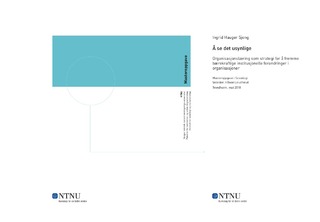Å se det usynlige - Organisasjonslæring som strategi for å fremme bærekraftige institusjonelle forandringer i organisasjoner
Master thesis
Permanent lenke
http://hdl.handle.net/11250/2571363Utgivelsesdato
2018Metadata
Vis full innførselSamlinger
Sammendrag
The aim of this master thesis is to study how organizational learning can be used as an approach to develop sustainable institutional change in the organizational practices. The thesis is based on a qualitative case study of an ongoing development project in an organization working with children and adolescents in a Norwegian municipality. The development project aims to create sustainable institutional change in the organization’ services preventive work. Their focus is shifted from individual-oriented repair to a collaboration-oriented and strength-based strategy in the environments children and youths participate. The analysis of the data is based on concepts from Luhmann’s Systems Theory and New Institutional Organizational Theory. These theories are used as analytical tools to study organizational learning as communication processes. The thesis aims to study how the organizational communication inhibits and promotes learning, how the relations between norms and practice have changed, and the characteristics of the learning strategy that have enabled these changes. The findings in this study show that it is possible for organizations to create sustainable institutional change in the organizational practice through organizational learning. The development of a strength-based language has helped the organization to develop new practices which have improved the working environment, the financial situation, the organizational reputation and cooperation with families and other collaborators. The study identifies different types of institutional logics that play a significant role in how the organization works and develops. The institutional logics have been summarized in two “paradigms”. The problem-based “paradigm” consists of the organization’s traditional logics and is characterized by problem-based communication that promotes “low quality” relations. These relations consist of unequal participation and lack of openness and understanding. The effects of these relations are disagreements, fault location, distrust, fear, offense, and injustice between the participants, and there seems to be minimal learning in these social systems. The strength-based “paradigm” consists of newly developed logics and is characterized by strength-based communication that promotes “high quality” relations. These relations consist of equal participation, openness and understanding. The effects of these relations are life-giving environments and behaviour that emphasize trust, participation, knowledge sharing, learning and development. The study indicates that the organization's acquisition of strength-based concepts that emphasize social systems, relations, and the positive aspects of human beings, have been decisive for the organization's ability to further develop these characteristics, and on this basis have made improvements in the preventive work.
